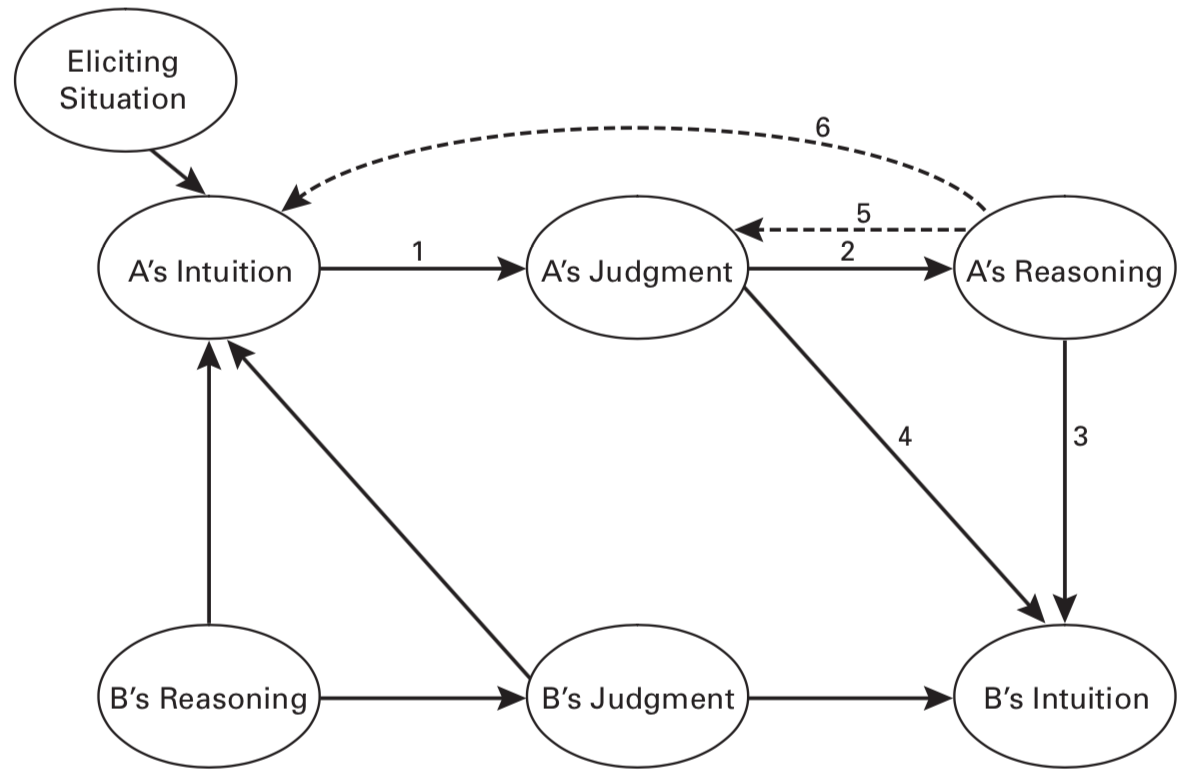Click here and press the right key for the next slide.
(This may not work on mobile or ipad. You can try using chrome or firefox, but even that may fail. Sorry.)
(If the slides don’t work, you can still use any direct links to recordings.)
also ...
Press the left key to go backwards (or swipe right)
Press n to toggle whether notes are shown (or add '?notes' to the url before the #)
Press m or double tap to slide thumbnails (menu)
Press ? at any time to show the keyboard shortcuts
Comparisons between Theories
[nativism] ‘There is a first draft of the moral mind’
[cultural learning] ‘The first draft of the moral mind gets edited during development within a culture’
[intuitionism] ‘Intuitions come first’ --- the Social Intuitionist Model is true
[pluralism] ‘There are many psychological foundations of morality’
Graham et al, 2019

Haidt & Bjorklund, 2008 figure 4.1
[nativism] ‘There is a first draft of the moral mind’
[cultural learning] ‘The first draft of the moral mind gets edited during development within a culture’
[intuitionism] ‘Intuitions come first’ --- the Social Intuitionist Model is true
[pluralism] ‘There are many psychological foundations of morality’
Graham et al, 2019
[nativism] ‘There is a first draft of the moral mind’
[cultural learning] ‘The first draft of the moral mind gets edited during development within a culture’
[intuitionism] ‘Intuitions come first’ --- the Social Intuitionist Model is true
[pluralism] ‘There are many psychological foundations of morality’
Graham et al, 2019
Affect Heuristic
Q: What do adult humans compute that enables their moral intuitions to track moral attributes (such as wrongness)?
Hypothesis:
They rely on the ‘affect heuristic’: ‘if thinking about an act [...] makes you feel bad [...], then judge that it is morally wrong’.
Cushman et al, 2010
[nativism] ‘There is a first draft of the moral mind’
[cultural learning] ‘The first draft of the moral mind gets edited during development within a culture’
[intuitionism] ‘Intuitions come first’ --- the Social Intuitionist Model is true
[pluralism] ‘There are many psychological foundations of morality’
Graham et al, 2019
Linguistic Analogy
‘the mind contains a moral grammar: a complex and possibly domain-specific set of rules [...] this system enables individuals to determine the deontic status of an infinite variety of acts and omissions’
Mikhail, 2007 p. 144
[nativism] ‘There is a first draft of the moral mind’
[cultural learning] ‘The first draft of the moral mind gets edited during development within a culture’
[intuitionism] ‘Intuitions come first’ --- the Social Intuitionist Model is true
[pluralism] ‘There are many psychological foundations of morality’
Graham et al, 2019
Dual Process Theory
Two (or more) ethical processes are distinct:
the conditions which influence whether they occur,
and which outputs they generate,
do not completely overlap.
‘[...] moral judgment is the product of both intuitive and rational psychological processes, and it is the product of [...] ‘affective’ and ‘cognitive’ mechanisms’
Cushman et al, 2010 p. 48

Haidt & Bjorklund, 2008 figure 4.1


What does the Moral Foundations Questionnaire measure?
Social Intuitionist Model
Unreflective ethical judgements are primarily consequences of moral foundations.
Dual-Process Theory
Unreflective ethical judgements are consequences of both moral foundations and processes which involve reasoning from known principles.